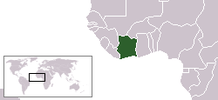Portal:Ivory Coast
Ivory Coast Prior to its colonization by Europeans, Ivory Coast was home to several states, including Gyaaman, the Kong Empire, and Baoulé. There were two Anyi kingdoms, Indénié and Sanwi, which attempted to retain their separate identity through the French colonial period and after independence. An 1843–1844 treaty made Ivory Coast a protectorate of France and in 1893, it became a French colony as part of the European scramble for Africa. Ivory Coast became independent on 7 August 1960. From 1960 to 1993, the country was led by Félix Houphouët-Boigny. It maintained close political and economic association with its West African neighbours, while at the same time maintaining close ties to the West, especially to France. Since the end of Houphouët-Boigny's rule, Ivory Coast has experienced one coup d’état, in 1999, and a civil war, which broke out in 2002. A political agreement between the government and the rebels brought a return to peace. Ivory Coast is a republic with a strong executive power invested in the President. Its de jure capital is Yamoussoukro and the biggest city is the port city of Abidjan. The country is divided into 19 regions and 81 departments. It is a member of the Organisation of Islamic Cooperation, African Union, La Francophonie, Latin Union, Economic Community of West African States and South Atlantic Peace and Cooperation Zone. The official language is French, although many of the local languages are widely used, including Baoulé, Dioula, Dan, Anyin and Cebaara Senufo. The main religions are Islam, Christianity (primarily Roman Catholic) and various indigenous religions. Through production of coffee and cocoa, the country was an economic powerhouse during the 1960s and 1970s in West Africa. However, Ivory Coast went through an economic crisis in the 1980s, leading to the country's period of political and social turmoil. The 21st century Ivoirian economy is largely market-based and relies heavily on agriculture, with smallholder cash crop production being dominant. The Côte d'Ivoire national football team (sometimes written "Ivory Coast" in English), nicknamed Les Éléphants (The Elephants), is the national team of Côte d'Ivoire and is controlled by the Fédération Ivoirienne de Football. Until 2005, their greatest accomplishment was winning the 1992 African Cup of Nations against Ghana on penalties at the Stade de l'Amitie in Dakar, Senegal. On 8 October 2005, they qualified for the 2006 FIFA World Cup, marking their first appearance on the World Cup finals stage. They were unable to qualify for the second round after losing to teams such as Argentina and the Netherlands in the so-called "Group of death". However, They did manage to win one game in Germany against Serbia and Montenegro, coming back from a 2–0 deficit to win 3–2 on a late penalty kick by Bonaventure Kalou.
Laurent Koudou Gbagbo (born May 31, 1945) has been the President of Côte d'Ivoire (also known in English as the Ivory Coast) since 2000. Formerly a history teacher, Gbagbo was one of the primary opponents of President Félix Houphouët-Boigny. Gbagbo was born in the village of Mama, near Gagnoa. He became a history professor and an opponent of the regime of President Félix Houphouët-Boigny. He was imprisoned from March 31, 1971 to January 1973. In 1979, he obtained his doctorate at Paris Diderot University (French: Université Paris Diderot, also known as Université Paris 7 - Denis Diderot). In 1980, he became Director of the Institute of History, Art, and African Archeology at the University of Abidjan. He participated in a 1982 teachers' strike as a member of the National Trade Union of Research and Higher Education, and at this time he formed what would become the Ivorian Popular Front (FPI). Gbagbo went into exile in France in the same year. He returned to Côte d'Ivoire on September 13, 1988 and at the FPI's constitutive congress, held on November 19–20, 1988, he was elected as the party's Secretary-General.
no subcategories
Template:/box-header Wikipedia:WikiProject Ivory Coast Template:/box-footer
The following Wikimedia sister projects provide more on this subject:
|
||||||||||




